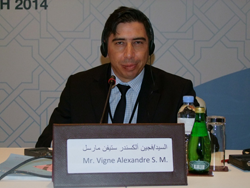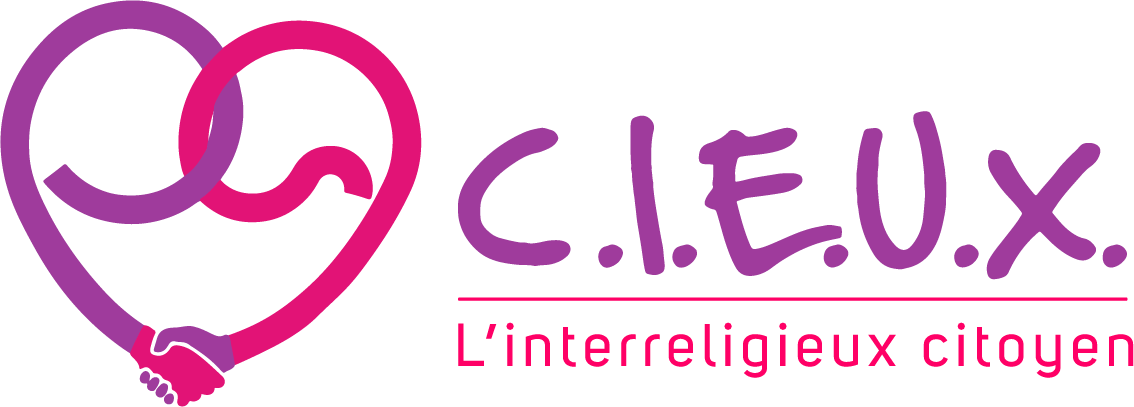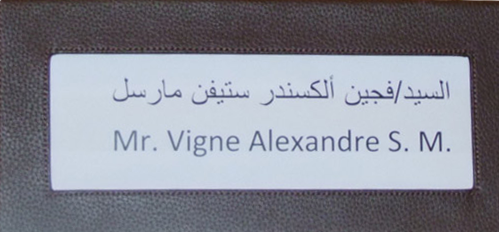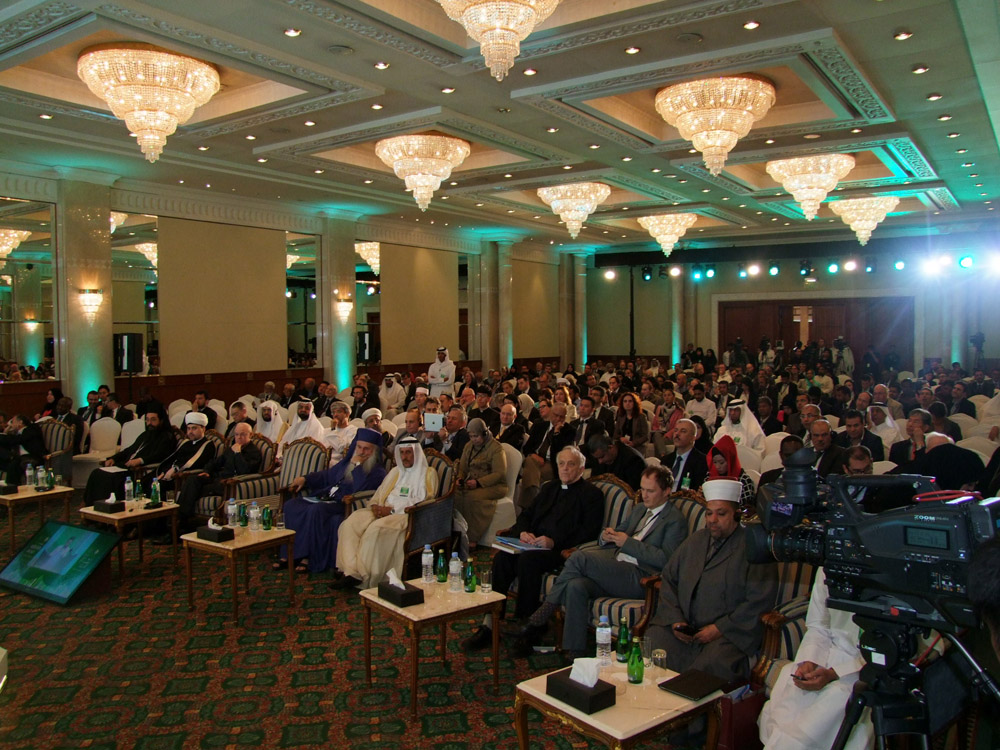Young people’s contribution to interfaith dialogue? by Alexandre Vigne (11th Doha Conference for Interfaith Dialogue)

11th Doha Conference for Interfaith Dialogue
“The role of youth in the promotion of dialogue”
Young people’s contribution to interfaith dialogue?
The production of inter-confessional and educational programmes through the media
by
Alexandre Vigne
President of CIEUX
Paris, France
Summary:
The media are particularly receptive to interfaith programmes that have social and civic impact on living together and inter-generational dialogue. Journalists show little interest in the dialogue of specialists, considered the reserve of theologians or mystics, notably monks who transmit their quest for the Absolute. On the other hand, they have proved to be more open to the charitable and civic forms of interreligious dialogue. The contributions by state bodies to these interreligious and civic programmes earns them a public recognition that the media willingly relay. This paper is based on the example of the CIEUX Association (Interreligious Committee for a Universal Ethics and against Xenophobia), which received the approval of the French Civic Service Agency.
___________________________________________________________________________
Mr. President,
Distinguished Ambassadors,
Fellow participants in interfaith dialogue,
To all of you who kindly invited us to participate in the 11th Doha Conference,
Firstly, I would like to thank DICID for the wonderful organisation of this event and for this initiative, whose purpose, in the words of its president, Prof. Ibrahim Al-Naimi, is to “nurture the dialogue between youth and their parents’ generation”.
Since 2005, CIEUX has organised hundreds of interfaith dialogues in France and abroad. Dialogues that have a particular feature: they are open to all. Men and women, faithful believers but also non-believers and those without religion can participate.
CIEUX encourages local inter-generational dialogue between residents and community faithful living in the same neighbourhood. The goal is to encourage the emergence of social ties between young people and older people (including isolated senior citizens) by establishing dialogue between believers of different religions and non-believers. Senior citizens are called on to contribute their point of view through these encounters that constitute new spaces of sociability. Those involved contribute to forging a community life in which traditions, wisdom and the experience they convey, are the building blocks of social harmony.
Why did we find it necessary to universalise interreligious dialogue at the local level?
In France as well as elsewhere in Europe and on other continents, we observed that in neighbourhoods, places of worship located adjacent to each other generally do not engage in dialogue even though they are all dedicated to peace. Everyone seems resigned to accepting this situation as if it were a fatality or an established social practice, with nobody seeing any paradox or perverse effects in this. However, the absence of local dialogue between residents and the faithful of religious communities is not socially neutral. We find instead that the absence of dialogue accentuates a number of problems. For example:
– communalism
– the deterioration of social ties
– xenophobic acts against places of worship, anti-Semitism, Islamophobia, Christianophobia, etc.
– discrimination based on origins and religion
– bias against others that is amplified by the media
I will not go into all these points. I would just like to say a few words about the preconceived ideas circulated in the media against religions and the initiatives taken by young people to promote living together.
In January 2013, an IPSOS Internet poll conducted in France for Le Monde among 1015 people aged 18 years and older showed that:
– 74% of respondents believe that Islam is an intolerant religion;
– Regarding the compatibility of religion with the values of French society, 89% of respondents put Catholicism first, compared to 57% for Judaism and 26% for Islam.
Conversely, CIEUX polls were not conducted directly on the Internet, but on the ground, in the course of 117 inter-community meetings, from 2008-2013, totalling 7,600 participants.
The correlation of the number of participants and their ages shows that Muslims are more likely to participate in neighbourhood interreligious dialogue for categories ranging from:
– 15-20 years: 44%
– 20-30 years: 58 %
– 30-40 years: 55 %
– 40-50 years: 40 %.
In other words, in the French population, it is Muslim students and young professionals who most readily contribute to neighbourhood civic initiatives within CIEUX encounters. Let me note that, of course, no proselytising has been observed during these interfaith dialogues, which means that the strong contribution of Muslims is due to their willingness to work on living together and cultivating a neighbourhood civic spirit. In fact, a July 2013 survey by the French National Institute for Demographic Studies (INED) shows that Muslims have more friends from another religion than Catholics and atheists[i]. This openness to others is not the result of a decrease in religious sentiment. In fact it’s quite the opposite: only 12% of Muslims break with their religion compared to 31% of youths raised by at least one Catholic parent. To explain the strong religiosity of young Muslims in correlation to their openness to other religions, a hypothesis is advanced by this study: the exclusion and racism that they experience increase their awareness of discrimination based on religious origins and, in reaction, this reinforces their consideration for their own tradition and the traditions of others.
Thus, the results of the INED study and CIEUX’s statistics offer a totally different perspective to the one put forward by the polls that appear in the media. The strong religiosity of young Muslims is not having the effect of a retreat into cultural isolationism and communalism but in fact is leading to greater openness to others, spiritually, culturally and socially.
How can we help journalists to relate the positive actions of religions? Journalists like anniversaries and willingly cover major religious holidays. But there is no annual inter-religious anniversary, except in the Lebanon, where, in 2010 the government decreed that the 25th of March would be a common Christian-Muslim national holiday to celebrate the Virgin Mary, a figure venerated by both religions! In France, mainstream newspapers, whether for a national or local audience, have no section devoted to religion. The reference to inter-religious matters is therefore indirect, only mentioned for example to illustrate a political, cultural, social or international subject.
A Catholic television channel in France, KTO[ii], did a report to our activities, showing the contribution of young people in the fight against xenophobic and racist prejudices. Of the 300 press articles that refer to CIEUX, only very few mention the topic of inter-community meetings as such, except to announce them. Journalists often treat interfaith dialogue not as a subject in its own right but as a means to draw attention to a cause: loneliness, hunger, integration, living together, the commemoration, the condemnation or the inauguration of such and such event, etc.
Consequently, CIEUX tries to generate media interest in interfaith and intergenerational dialogue in two ways: first, by promoting articles and reports on interfaith matters and secondly by presenting the positive effects of local dialogue to journalists. The CIEUX website will soon present the press articles and videos published daily by the media of more than 200 countries. To carry out this media monitoring, CIEUX France has hired a webmaster of Tunisian origin. We hope that by making journalists aware of the true place of the interreligious theme in the global media in this manner, they will be encouraged to give it greater consideration. Furthermore, CIEUX makes efforts to educate journalists, explaining how the dialogue between the communities and residents of the same city has many positive effects. Thanks to interfaith dialogue:
– Persons from a background of immigration feel better understood and more inclined to contribute to civic life;
– Religious communities fit in more easily in territories and foster social integration by offering their faithful a network of local relations;
– Neighbourhood councils and other municipal bodies are better known by those who attend places of worship;
– Infringements of human rights, discrimination based on origins and religion, and racist, anti-Semitic and xenophobic acts are subject to increased vigilance;
– Local politicians cooperate with greater effectiveness during national festivals, commemorations, initiatives of mutual aid and solidarity or appeals to living together.
The contribution of religions to fostering neighbourhood civic participation encourages journalists specialising in civil society to take an interest in an area they formerly did not dare venture into.
It was the same for the Civic Service Agency. Created in 2010 to offer youths aged 16 to 25 the opportunity to get involved in civic service, the following year this state agency gave its approval to CIEUX under the theme of “Education for All”. The heading of the approval relates to missions to “support the organisation of visits and dialogues on diversity”. In 2012, CIEUX’s approval was extended internationally. As a result, the CIEUX association received a dozen young volunteers who successfully developed a proposal for intercultural and religious dialogue in the Paris region, but also in Burkina Faso, Israel, Senegal or Sweden, thus contributing to the objectives of promoting cultural diversity and living together. Thanks to the volunteers, young people are participating in enriching activities: visits to museums and exhibitions, the discovery of the architectural heritage of places of worship, workshops on cultural diversity, secularism and neighbourhood civic life, talks by community officials on religiously-motivated xenophobia, etc.
This official approval is a mark of confidence and recognition for the CIEUX association that its action contributes to the goals of “national cohesion” and “social diversity” promoted by the Civic Service.
The association is of course delighted to see its capacity for action reinforced by the arrival of volunteers who extend, to a younger audience, its efforts to promote diversity through mutual discovery and constructive dialogue. For 2014, the association is authorised by the Civic Service Agency to recruit volunteers who wish to carry out a six to nine month mission of general interest, including in Doha. These young people can participate in international missions supporting all forms of local development on condition they are not taking the place of employees, local staff or International Solidarity volunteers. Each volunteer will receive a stipend of a little more than 600 euros a month from the state to cover his/her daily expenses (including accommodation). The CIEUX association would like to define international educational, cultural, social or economic missions that are in line with its own objectives of promoting local civic participation (through interreligious and secular dialogue) and of genuine interest to local development. Schools, community centres and hospitals may act as host institutions, as well as municipal authorities. The different religious organisations, because they are engaged on a daily basis in dialogue and living together, are well placed to identify projects and to carry them out with the help of volunteers who are selected and trained by the association and financially supported by the Civic Service Agency. Once the paperwork is submitted, the validation procedure takes one and a half months, after which the young volunteers can apply on the Civic Service Agency website.
To conclude, let us hear the testimony of Rina, currently a Civic Service volunteer for CIEUX in Haifa, Israel: “I was sent to Israel as part of my French civic service to create an inter-religious dialogue in Haifa with the CIEUX Association In the course of these few months, I noticed that it came easily to me to develop a dialogue with young people. Firstly, being twenty-four myself, young people are my peers and form the largest part of my entourage. Between young people, discussion begins easily and debate is generally devoid of preconceived ideas and full of a common desire for understanding and living together. Because young people project themselves into the distant future, it makes them more open to interfaith dialogue, and more aware of the importance of knowing one’s neighbour. Particularly in Israel, the new generation was born in the country and grew up in almost the same conditions, which puts them on an equal footing, compared to the previous generation made up of people from around the world (Jordan, Morocco or Russia, etc.). Today, the different ways of speaking have been erased and with them, preconceived ideas are gradually disappearing too. This terrain is fertile for the development of interfaith dialogue, which is the key to peaceful and durable living together. The challenge is to successfully interest and engage young people in this kind of project: when you get commitment and application, it creates a dynamic that powers the dialogue! May all projects be productive!”
In May, as part of the European Youth in Action programme, CIEUX is participating in a multi-annual symposium on methods to raise awareness through the media of the positive effects of interfaith dialogue. I will have the honour, if you will allow me, to share with you the rich and promising results of our lecture!


